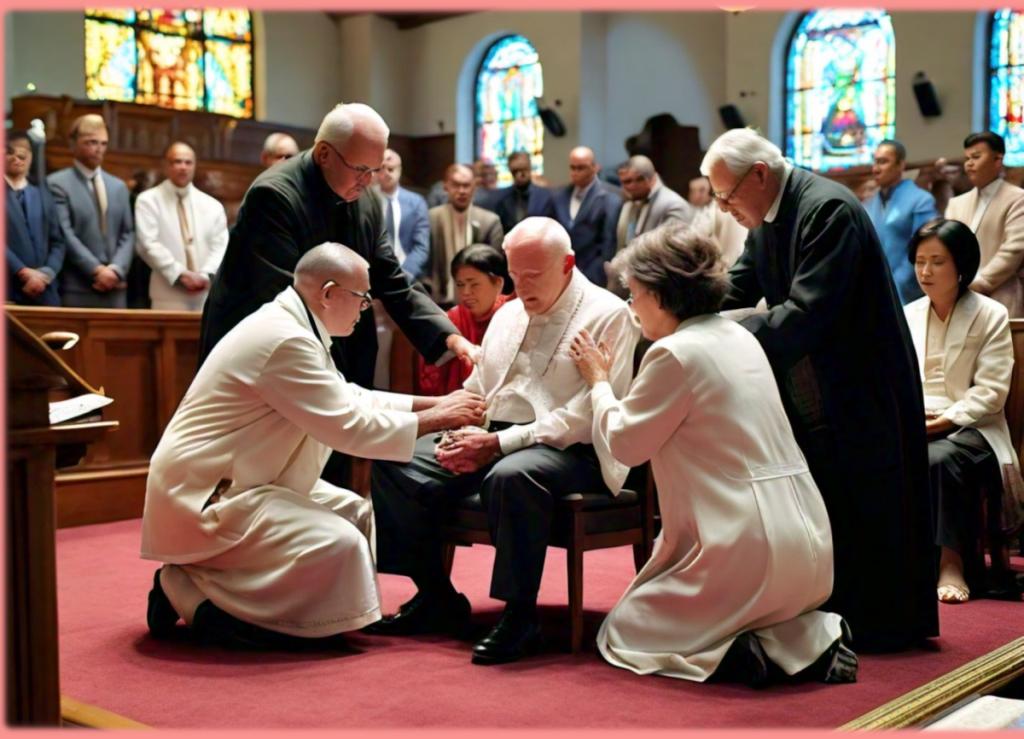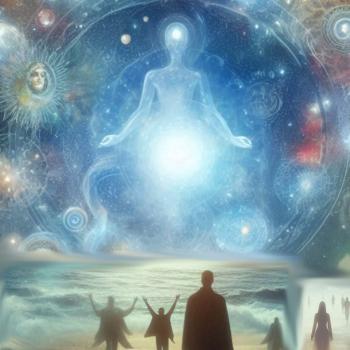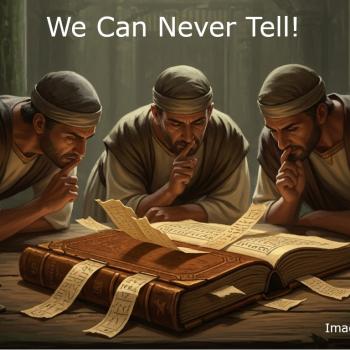Practical spirituality series.
We love to throw contemptuous words at each other, branding others as being disapproved of or unacceptable. Soon a word becomes a symbol of everything we hate and everything we hate gets lumped in. We hate everything not like us. We like black and white and easy thinking, so shades of difference become something to hate. Yet we are predominantly similar despite minor differences. Argh!
Only two categories exist for being and behavior.
- Behavior that represents a God of love by walking in the way we’re shown to walk by Jesus. Our being is manifested in our behavior. We are always becoming.
- Behavior that is disrespectful to God, or injurious or neglectful of others. This also reflects our state of being. God is tolerant and forgiving. Forgiveness by others is based on our making things right if we can. We are always turning away from injurious behavior and becoming more like the pattern of God set before us.

The word secular comes from the 13th Century. It meant, regarding clergy, “living in the world, not belonging to a religious order,” or “belonging to the state” as opposed to the Church.
By the 14th Century, secular gained the meaning of “concerned in earthly more than in spiritual life.”
Today, the word secular means “without regard to religious belief.” It’s an idea and tradition that blossomed through centuries of use, but lacks foundation.
The word sacred means “connected with God, or dedicated to a religious purpose.” All life is sacred.
Changing attitudes about worldly
Different translations show how this attitude of dividing the universe into what is “worldly” and what is religious, sacred, or spiritual has grown. In the King James Version, the word “worldly” only occurs twice. The Revised Standard Version uses it twelve times. I’ll not do a deep dive into the words because it doesn’t go to my point.
Jesus didn’t use the word worldly. In one use of the word world, he said in Matthew 22:26 (NASB), “For what will it profit a man if he gains the whole world and forfeits his soul? Or what will a man give in exchange for his soul?” This refers to ill-gotten gain or neglecting to do worthwhile things. It doesn’t brand the world itself as sacred or evil.
There is no indication Jesus thought of the world as something separate from God.
Our behavior isn’t inherently good or bad. It depends on whether we do things out of love for others or to injure or neglect others.
The Apostle John used the word “world” more than others in the gospels. It gives us a clearer picture of what Jesus meant by the word world.
“These things I have spoken to you, so that in Me you may have peace. In the world you have tribulation, but take courage; I have overcome the world.”” – John 16:33 (NASB)
The world has temptations that attract people with the illusion that certain types of behavior bring a fulfilling life. Misdirected sexual lust, love of money, love of power, jealousy, theft, mistreating others–these all have a certain reward, but they end in misery. Jesus was tempted but didn’t fall prey to these.
There are people who promote these behaviors for money. But these don’t represent the entire world. You can’t place a blanket of condemnation over the entire world because of the actions of a few. You can help people understand these actions lead to problems in life, not to a fulfilling life.
“The world” is an expression
“I have given them Your word; and the world has hated them, because they are not of the world, even as I am not of the world. I do not ask You to take them out of the world, but to keep them from the evil one. They are not of the world, even as I am not of the world. Sanctify them in the truth; Your word is truth.” – John 17:14-16 (NASB)
In this verse, Jesus is talking to God about the apostles he gave God’s word to. Jesus says they have spiritually become like him, but they are to remain in the world for a continued mission. He asks God to sanctify them in truth, the word of God. Sanctify means to set apart as holy. Holy means dedicated to God or a religious purpose.
Jesus expressed sorrow over so many in the Jewish nation refusing God’s word and despising his apostles. This is despite his many successes in gaining huge numbers of Jewish followers and even his few forays into the non-Jewish world in which he was amazed at people’s faith. It wasn’t a complete condemnation of the world, but rather targeted those who refused to believe.
Jesus asked God to set apart his apostles in God’s word of truth. Some individuals are set apart for spiritual and religious endeavors. They aren’t better than everyone, but they have a dedicated mission.
God created the world. God created people. God is in everything and all life is sacred – all we have to do is look within ourselves to know God, and follow the way shown us. But we have to determine what is love, and what is action based on love, which is a lifetime of learning. Our actions, if they disrespect God or injure others, can be the opposite of what it means to love.
Other apostles on worldly
In the Revised Standard Version of the Bible, the Apostle Paul was the apostle most often to have a word translated as worldly. Jude had only one word translated worldly, and the rest had none. Jude spoke of people who were worldly and devoid of the spirit. This was specific, not all-inclusive.
Sacred, set apart, and worldly
All life is sacred. We are all part of God and connected with God. We are all becoming more like God or, through our experiences, learning to become more like God. We are all part of this world, and nature and the physical are inseparable from God.
Are we sanctified? Set apart? This is a term that applies to those given a special status, such as in ministry. People undergo an ordination ceremony where elders, deacons, priests, or pastors lay hands on them to set them apart.
Each one of us who follows Jesus or follows the Way, has been granted a special status. We have forgiveness. Forgiveness is not given to people unless they ask. But Christians have the status of always asking, unless they don’t. They also have the special status of emissaries, a light for others to see. Matthew 5:16: “”Let your light shine before men in such a way that they may see your good works and glorify your Father who is in heaven.”
Christians aren’t perfect. We’re all becoming, just like everyone. We escape judgment because in the kingdom we are constantly progressing and forgiven.
Western religion tends to be wrapped in an instantaneous individualism wrapper. Say the right words and you’re in the spiritual kingdom and on your way to Heaven. End of story. No sanctification. But accepting Jesus’ way of living is just the beginning of the story. Walking the Way transforms us, and through our actions we show the love of God to others.
Our jobs, families, popular music, homes … all we are and do is sacred. They are all about life. Our jobs all help others in some way. Our families bring new people into the world and help them learn to do beneficial things and avoid the false attractions in life. Most of our music celebrates life or tells us about the pitfalls. Our homes are the shelter from which we love our family and others.
Only when we injure others through our behavior or inaction do we depart from the sacredness of life.
We are physical beings, subject to all the temptations and illusions present in this world, just as Jesus was. We are in this world but not of this world because we belong to a spiritual kingdom that helps us overcome the things that would bring us down. Only certain things in this world are creations of people who are devoid of the spirit. This world is sacred unless we make it not.
Conclusion
We spend too much time making divisions in our world when we should be trying to find ways to bring us together. God is love, and he loves all of his creation.
Traditions of interpretation grow over time and become misleading. The big error with the words sacred and secular is to think life is split into Christian and the rest of the world, and the rest of the world is condemned. The world is sacred–God is in it.
We make part of the world not sacred when we misuse it. We’re all sacred.
Those who follow God and ask forgiveness are not judged. Others face judgment. Judged doesn’t automatically mean condemned. But if people live a life of harm to others, they can’t expect the balance to be in their favor. (It takes a deep and lengthy reading of Jesus and the Apostle Paul to understand this, especially in the current era of emphasis of separation from the world.)
Christians need to get out of this mire of endless thinking about judgment of the world. They ruminate on it like cows chewing their cud, then it comes up and they chew it again, and then again, through four stomachs. Focusing on judgment is a diversion from mission. Christians are not set apart to judge others and run around declaring what is sin. They are set apart to be a light to others.
The light is the Good News. This Good News is their mission: Forgiveness lifts people out of the endless trap of shame and guilt. It’s a new start. Love is the answer. Following the Way of God is transforming into an abundant life. Christians show that love to others. Like God, we are tolerant and forgiving.
Jesus said, “… I am the way and the truth and the life. No one comes to the Father except through me.” Jesus represents the way to live shown by God. This is the true way and avoids the traps set by temptations and illusions. Through the true way, people have life.
“… I came that they may have life, and have it abundantly.” – John 10:10
Life isn’t wealth. It’s our relationships with others.
Probability Space
What probability spaces can we open in our minds to focus on how to be a light to show the love of God to others? Can we give people a smile every day so they know they are accepted and welcome? Are we able to be the Good Samaritan who generously helped the man beside the road who had been mugged? Can we support shelters for the homeless and the abused?
Potential Space
If you think creatively and allow your mind to wander and explore, how can we make the world more just and fair?
We have issues with acceptance and discrimination. We have major problems with income inequality.
– Dorian
Our answer is God. God’s answer is us. Together we make the world better.













